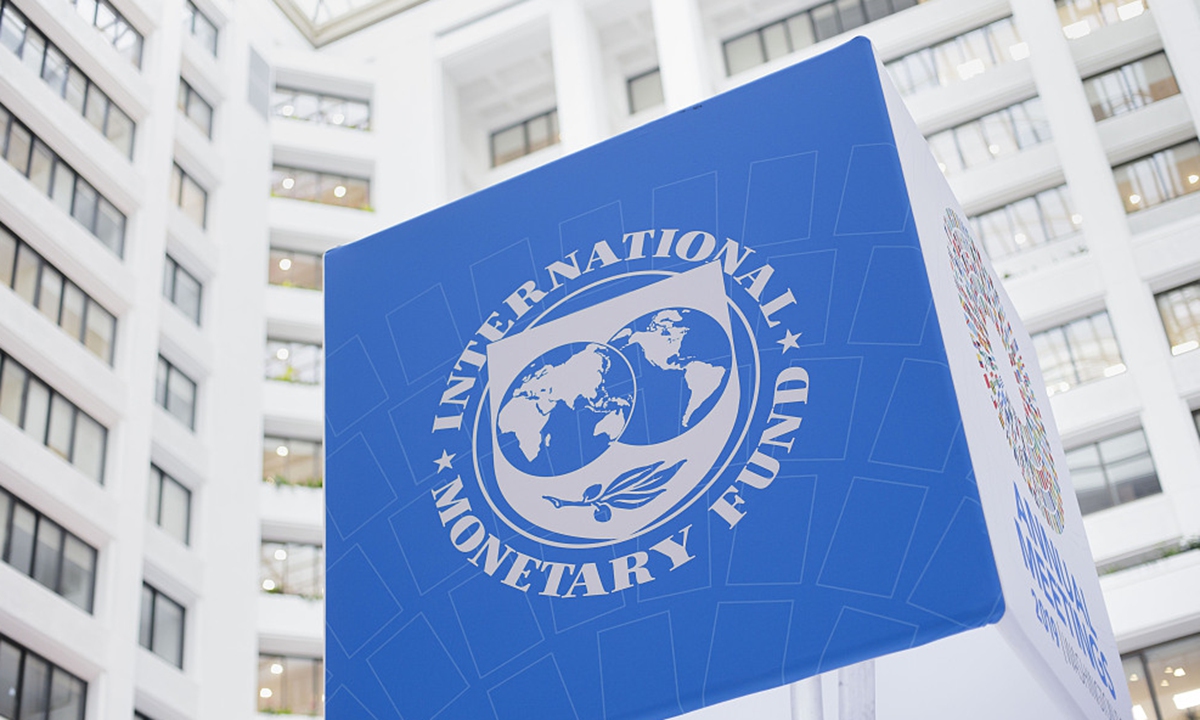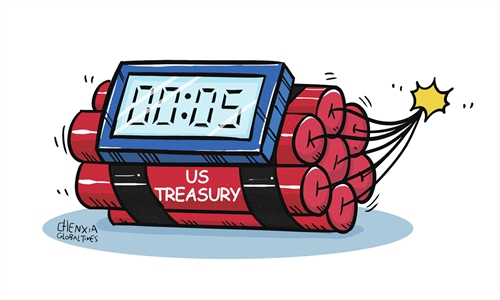
IMF Photo: VCG
When the annual meetings of the IMF and World Bank kicked off on Monday in Washington and last through Saturday, they are expected to spotlight a thorny conflux of crises including the fallout from the prolonged pandemic, escalating geopolitical tensions, soaring inflation and mounting recession fears.
As the US-led Western mentality - being self-centered and tending to shirk their responsibilities - prevails, there is scant hope of genuinely addressing the plight of lower-income economies in particular amid the current gloom, experts said. The nail-biting predicament pits the West's "hypocritical" approach to handling the crises against China's, which is making good on its opening-up and de-carbonization promises, they noted.
An expanding Chinese economy, albeit at a slower pace, would inject much-needed optimism into the recession-haunted world economy, observers remarked. As they put it, the upcoming 20th National Congress of the Communist Party of China (CPC) is envisioned to anchor the country's economy toward more cohesive growth, setting the Chinese economy apart from those of many of its global peers mired in internal rifts and consolidating the China's role as a stabilizer to global growth.
Global picture
The IMF on Tuesday lowered its 2023 global economic growth forecast to 2.7 percent from its July prediction of 2.9 percent, citing high energy, food costs and rate hike pressures and warned "the worst is yet to come."
A conversation between World Bank Group President David Malpass and IMF Managing Director Kristalina Georgieva at the start of the first in-person gatherings of the two organizations in three years apparently put market watchers on edge over the global growth outlook.
Malpass warned of "the risk and the real danger of a world recession next year" during the Monday dialogue, according to the transcript posted on the World Bank's website.
In Malpass' words, "the advanced economies are slowing in Europe and so we'll see where it goes into next year, but the currency depreciation means that the debt levels for the developing countries are getting more and more burdensome."
The super strong US dollar in the wake of the US Federal Reserve's drastic rate hikes has dealt a big blow to non-dollar currencies, subjecting developing economies reliant on foreign debt to higher costs of servicing the debt, economists concurred.
Georgieva revealed calculations that "about one-third equivalent of the world economy would have at least two consecutive quarters of negative growth this year and next year."
"The total amount that would be wiped out by the slowdown of the world economy is going to be between now and 2026, $4 trillion, this is the size of Germany's GDP gone," the IMF chief said.
Adding to anxieties, Jamie Dimon, CEO of US investment bank JPMorgan Chase, said in an interview with CNBC on Monday that the US will likely tip into a recession in six to nine months from now.
While the ongoing IMF/World Bank meetings are part of a global effort to keenly find a way out of the dire economic situation, it seems that the prime culprit of the dead end, in particular, has dodged its responsibility to genuinely detonate the recession bombs, observers said.
The answer to averting a recession is fairly evident: The US ought not to always put its own interests ahead of others, Gao Lingyun, an expert with the Chinese Academy of Social Sciences in Beijing, told the Global Times on Tuesday.
An unruly road map for the US economic revival has seen the Fed shift sharply toward supersized rate hikes this year after having insisted on prolonged quantitative easing, putting the global equity and foreign exchange markets at stake. A continued hawkish stance, as pressured by unexpectedly high inflation, is shown to have increasingly pitted the Fed against the market.
A fresh example of a rising call against the recession-fueled Fed moves is an open letter by Catherine Wood, chief executive of US asset management firm ARK Investment.
Wood, the famed stock picker, said in the open letter to the Fed dated Monday that "out of concern that the Fed is making a policy error that will cause deflation, we offered some data for our 'data-driven' Fed to consider as it prepares for its next decision on November 2."
This, adding to some Western countries' backsliding on climate actions, is proof of the West's hypocrisy when it comes to putting the global economy back on the recovery track, Gao commented, labeling the US-led Western world as habitually behaving in an irresponsible manner.
In stark contrast, China has unwaveringly pushed for de-carbonization efforts and posted an expansion despite domestic virus flare-ups and rising uncertainties across the globe, he went on to say, emphasizing that the Chinese economy continues to be a beacon of confidence.
China remains ballast stone
Although China's growth would take an inevitable hit from the global sluggishness, the economy remains well placed to emerge from the headwinds' fallout, analysts said. They hoped for the economy to power the global economy ahead. The imminent CPC National Congress is considered to funnel even more optimism into those aspiring for a China-pioneered rebooting across the globe.
Weakening external demand and fears of a global recession put greater downward pressure on exports, Chang Ran, a senior research fellow at Zhixin Investment Research Institute, said in a research note sent to the Global Times on Tuesday.
In August, the WTO cut its global commodity trade growth forecast by 1.7 percentage points. As the correlation coefficient of China's export growth versus the global reading stands at around 0.7, the country's export growth is estimated to moderate in line with a slowdown in global trade in the fourth quarter, Chang said.
Nonetheless, China, the only country in the world with a complete industrial system, will continue to prop up its export supplies. Additionally, a raft of measures unveiled to stabilize foreign trade and investment, among other broad-based pro-growth policies, are set to underpin export growth, the research fellow continued.
The Regional Comprehensive Economic Partnership (RCEP) that took effect at the beginning of the year has amplified the heftiness of Southeast Asia as China's trading partner.
On top of that, the continued improvement in China's business environment and a huge consumer market will continue to lure in foreign investment, according to economists.
In the first seven months, the country's actual use of foreign investment jumped 17.3 percent year-on-year, per official numbers.
Foreign direct investment into the country will continue its upward trajectory, Chang predicted. Meanwhile, runaway inflation and an energy crisis have put some regions in Europe in a passive mode of "deindustrialization." This suggests that China, underpinned by its complete industrial categories and huge market, continue to be the destination for relocating Europe's manufacturing sector.
Such strengths are supposed to not only shield the economy from global gloominess, but also paint China as a sustained growth engine for the global economy, experts said.
Putting the economic growth in a range of 3.4-3.8 percent in the third quarter, Cao Heping, an economist at Peking University, told the Global Times on Tuesday that China would still deliver reasonable growth for the whole of the year.
The forthcoming CPC National Congress will anchor the economy toward more cohesive growth, Cao believes. A more cohesive route to growth as mapped out by the Congress will set the Chinese economy apart from many of its global peers mired in internal rifts and consolidating the country's role as a stabilizer to global growth, he said.
The continued expansion of the Chinese economy will surely breathe confidence into the world haunted by a recession in the making, Gao stressed.


